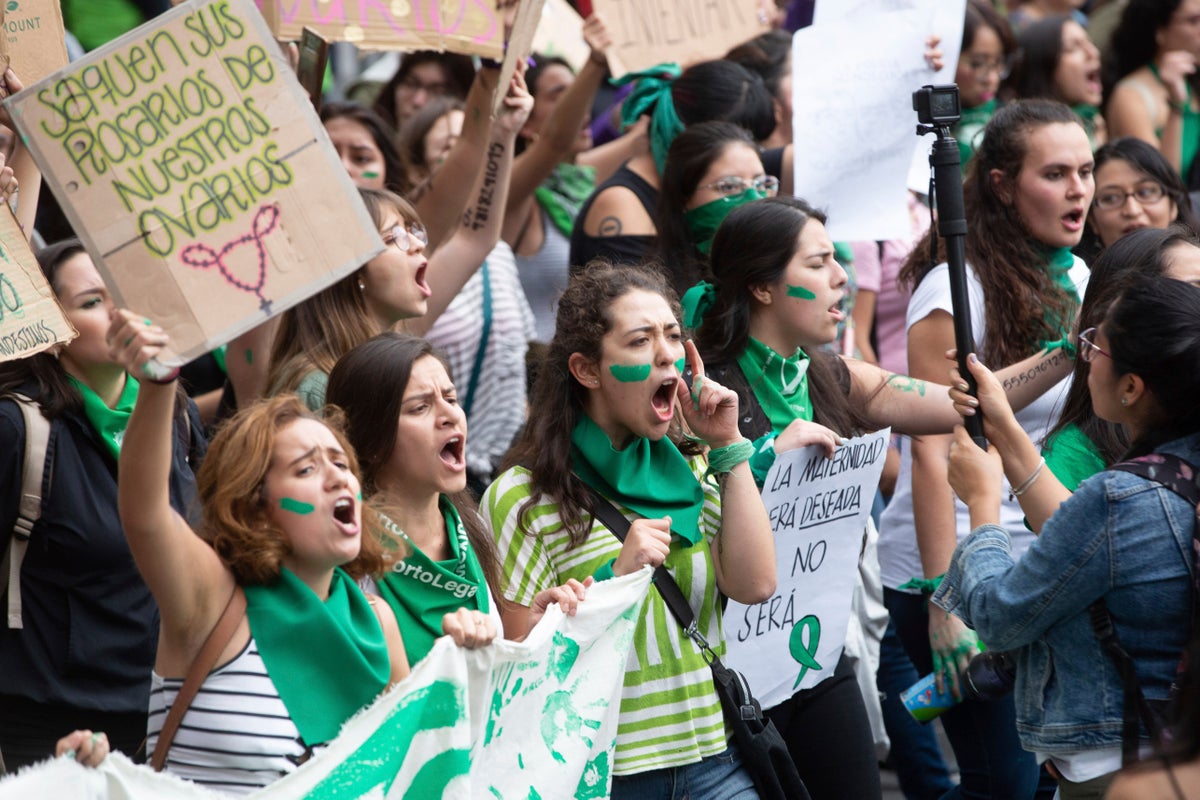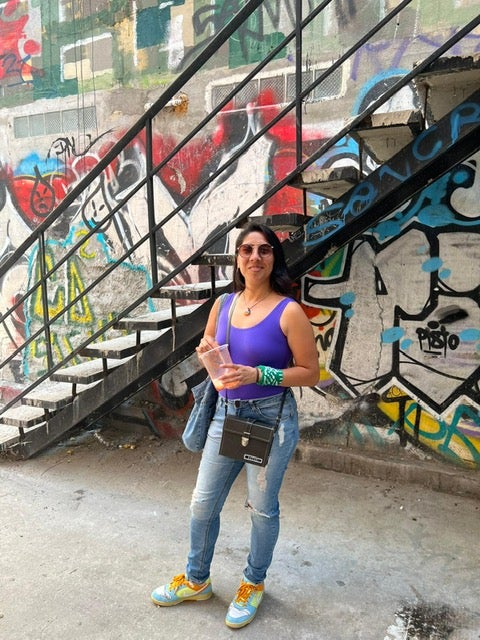
Crystal P. Lira struggles to put into words the aching loneliness and anxiety that tortured her as she travelled by foot, trolley and bus from her city – and country – for an abortion in 2012.
“Forty minutes of travel can feel like hours, because you’re just by yourself and thinking many, many things that are from stigma and disinformation,” the 37-year-old Tijuana native tells The Independent.
Her fraught journey was from Mexico, where abortion was then illegal and heavily stigmatised, to a Planned Parenthood in the US. At the time, the US was light years ahead of its southern neighbor when it came to advancements in, access to and attitudes towards abortion.
Never did Ms Lira imagine that, a decade later, she’d be helping American women needing abortions in a twisted and unexpected reversal of fortunes. In September, Mexico decriminalised abortion nationwide, though much progress remains to be made; on Friday, the Supreme Court of the United States struck down the 1973 Roe v Wade decision which had legalised abortion across the country, prompting several states to immediately enact trigger bans.
Now, millions of American women are left in reproductive limbo, with no abortions available at all in some states and risks of prosecution for a range of abortion-adjacent activity in others. All the while pills inducing pregnancy loss are available over the counter just across the border in Mexico.

Mexican activists – women who’ve spent decades clamouring for rights in their own country, where they continue pushing for more progress – have now leapt into action to help their counterparts in what was formerly considered an abortion oasis, compared to the Latin American nation.
“There is an opposite situation now,” Veronica Cruz Sanchez, a prominent abortion and women’s rights activist who founded feminist organization Las Libres, tells The Independent – adding that she, like so many others, is very surprised by the development.
“We always thought that the US was the first world country; we wanted to be like it,” she says. “We wanted to have a Roe v Wade ruling.”
Before the Mexican Supreme Court finally did rule last year that penalizing abortion was unconstitutional, Ms Cruz Sanchez and likeminded activists organised a complex, efficient and dedicated underground network to educate women about abortion, facilitate access for those who needed it and even physically support or accompany them.
In recent years, much of their work has centred on helping women with pill abortions at home, doing everything from obtaining the medicines to walking them through how to use the drugs, most often mifepristone and misoprostol. When used in combination, the drugs have a success rate of 95%. They can be purchased for as little as $40 in Mexico; misoprostol doesn’t even need a prescription.
These efforts are ongoing and provide a near-seamless framework for not only helping people in need of abortions on the other side of the border, but also for advising activists in the US how to best set up their own networks.
Groups like Las Libres, based in Guanajuato; Red Necesito Abortar, based in Monterrey; and Colectiva Bloodys, based in Tijuana and run by Ms Lira, were already seeing an uptick in requests from women in the US before Friday’s Supreme Court ruling and were preparing accordingly.
“Surely, from today, the demand will increase,” Ms Cruz Sanchez tells The Independent, just hours after the Roe v Wade reversal was announced. But “in reality we were already preparing ourselves with more medicines, hands and heads to [facilitate] safe abortions for all the women who need it, to organize more and more networks of solidarity with the US population.”
Sandra Cardona, who runs Red Necesito Abortar with her partner, Vanessa Jimenez, learned how to support women in need of abortions from Ms Cruz Sanchez and Las Libres, which have been incredibly proactive in training other Mexican activists.
Speaking just days before the Roe v Wade reversal – but expecting the worst – Ms Cardona says she’d organised the delivery of three pill packages that morning alone.
“Before, there were five people a month, at most,” who needed help from the US, she tells The Independent.
Most of the American women seeking abortions – and volunteers who want to help – find groups like Ms Cardona’s through social media. Many of them are in Texas, which not only borders Mexico but last September passed the most restrictive abortion legislation in the US before Friday’s decision. Though, says Ms Cardona, the location and experiences of people seeking help run the gamut.
“There are women of all kinds,” Ms Cardona tells The Independent. “There are young people. There are migrant women. There are women who do not speak Spanish, so we do it through WhatsApp, because ... it is important that they have access to medicine and information without stigma – that they are not afraid to do it from home.”
Ms Cardona and Ms Jimenez also open their own home to women choosing to undergo medical abortion, providing a safe and private space they’ve named La Aborteria. They’ve already hosted Americans; it varies from week to week how many they might see.
“And we do everything online,” Ms Cardona says. “In other words, since we also send medication to the United States, sometimes it is easier for them to receive the medication by mail.”
Members of the Mexican networks can either physically take pills across the border or mail them, often working in tandem with activists in the US side who help distribute the medications. While social media has been awash with people expressing or offering support for women looking for abortions – both before and after Friday’s decision – activists in Mexico say they’ve also seen concrete action from truly committed volunteers.
“Many women from the US write to me,” Ms Cruz Sanchez tells The Independent. “They tell me they want to offer support, some give medications, other transport the medications, others send them; othere are even training to accompany” women.
The opportunity to access abortion care in Mexico has not been lost on US lawmakers, either. In May, as speculation swirled after the leaked Supreme Court draft opinion indicating Roe v Wade would be overtrurned, a group of state legislators from Arizona, Colorado, New Mexico, North Carolina and Texas travelled south to witness firsthand the strides Mexico and its people were making in expanding abortion access – to Americans, as well.
“It is incredibly touching to see people opening their homes, opening their hearts, spending time and effort helping American women, Texas women predominantly for now, access care,” Democratic Texas state Rep. Erin Zwiener said at the time.

Many activists not only have solidarity with Americans as fellow women; there’s also a particularly deep bond because of the geographical and, particularly, ethnic ties to the US population, Ms Lira says.
“First of all, we are a neighbour country,” she tells The Independent. “And because we are neighbour countries, a lot of the Mexican community, Latin American community, are trying to reach the United States ... so we are pretty aware that there’s a lot of [Latinx] women that live in that country.
“They are first-generation Latin American women or Latin American people in the United States, or they were brought when they were very young. And now they’re struggling to go to university, to have healthcare, to have good income. And now they won’t be able to live their sexuality and then decide whatever they need from an outcome of living their sexuality.
“It’s like, we don’t know that woman personally, of course, but it’s like it’s our woman. It’s us. It’s from our countries.”
Often, she says, it’s those communities – the immigrants, the children of immigrants, the migrant workers – who will be hardest hit by the Supreme Court reversal.
“Probably, access is going to continue some way for some women that will be able to pay for it or will be ale to move from one place to another to get the abortion,” she says. “There’s always access to it. But it’s just going to be for certain women that can do that. But for the rest ... that’s where women from Latin America” will be more heavily affected.”
After dedicating her life to social justice, Ms Cruz Sanchez calls the current situation “a historic moment.”
“I never imagined that Mexico would do this, that Mexican women would do this, that we would have a solution to a US problem,” she tells The Independent.
She says she’s “outraged to see the decisions made by those tasked with guaranteeing our rights.
“At the same time, I feel hopeful that the US society will learn from” Mexico and the “experiences that we have deployed in the region – that [they] will turn to see Mexico is offering solidarity to women who need an abortion so they don’t put themselves at risk.
“Know that we have a safe abortion alternative for them, even at home, without anyone knowing if they don’t want to ... we have developed a great social and political movement for the social decriminalization of abortion.”
Ms Cardona, in Monterrey, calls the Roe v Wade reversal “a total setback for women.
“And women are not second-class citizens,” she tells The Independent. “On the contrary, we deserve all rights.”
As the US reels in the aftermath of the decision, millions are left with limited options and networks scramble to form and help, she reiterates that Americans can turn south for support.
“Here we are,” she says. “Let them know that they are not alone.”







